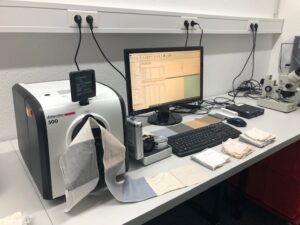Catalytic isomerizing oxidation of oleic acid derivates as an innovative production method for myristic acid

Many cleaning agents and cosmetics contain so-called ‘tensides’ as their active washing ingredients. These are obtained from palm or palm kernel oil or produced from petroleum (fossil raw material). Of the approx. 400,000 tonnes of palm oil imported, approx. 10% are used for detergents and cleaning agents. When used in Germany, palm oil-based surfactants have a significantly worse greenhouse gas potential than fossil-based surfactants. Compared to fossil or palm oil-based surfactants, rapeseed oil-based surfactants have a 60% reduction in greenhouse gas emissions. This is due, on the one hand, to the higher productivity per hectare of palm oil and, on the other hand, to the frequent destruction of primary forests in the countries of origin, which are urgently needed in the future as a biodiversity reservoir and climate regulator.
The first step in the processing of imported oils is the extraction of myristic acid, which is an important component of soaps and surfactants.
The aim of the project is the chemical conversion of oleic acid, which is abundant in rapeseed oil, into myristic acid by catalytic oxidation. Although the oxidative cleavage of oleic acid is state of the art, the known methods do not produce myristic acid. In the course of the project, catalysts are therefore to be developed that shift the C=C double bond and guide the oxidation in a suitable way. Furthermore, the products are to be subsequently purified and incorporated into formulations to test whether and how the cleaning effect is designed.

The process to be developed, which is based on the use of oleic acid from European oilseeds such as rapeseed or sunflower, which is available in large quantities, could significantly contribute to the change in raw materials used in the production of cleaning agents and cosmetics. Innovative catalysts may make it possible to initiate the general goal of a change in raw materials towards a circular economy in the field of cleaning chemicals.

